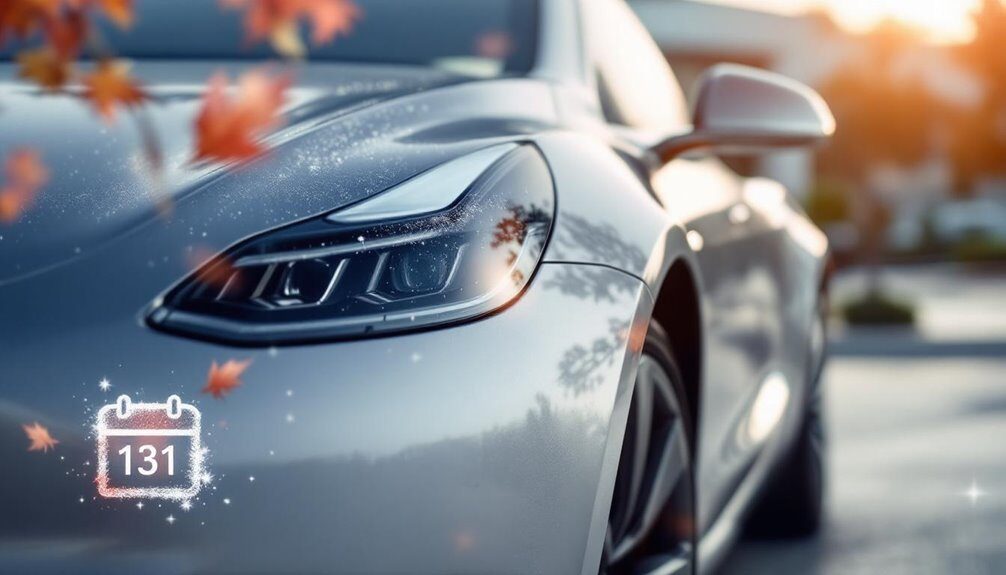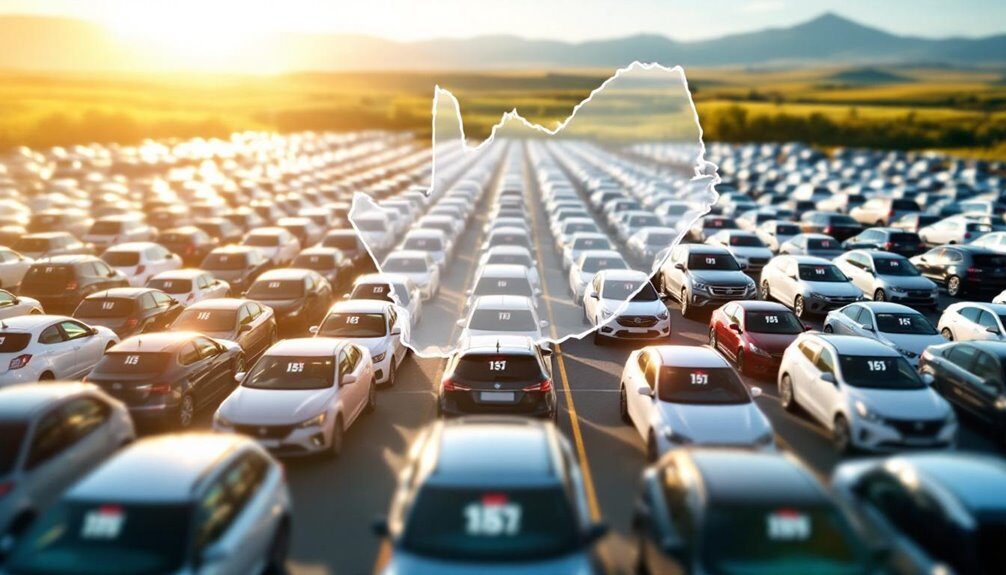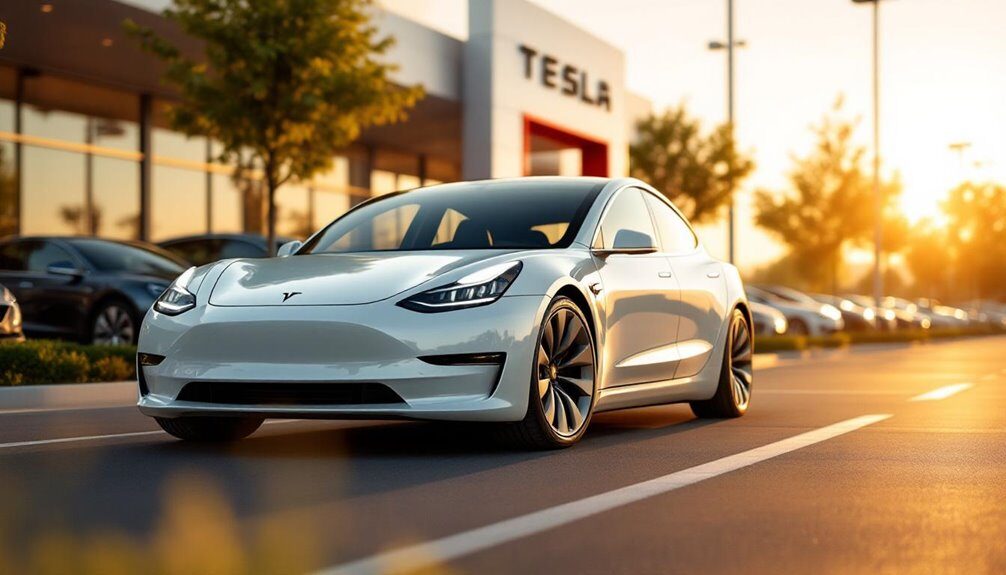You’re looking at Toyota and Volkswagen—no surprise there. Toyota dominates with 40% of South Africa’s top ten used models and commands R6,488 above expected prices. Their bakkies? They’re holding 85–90% of value over three years. Volkswagen’s Polo Vivo sits pretty at 78% retention. Japanese brands like Honda and Mazda keep winning too. The real winners? Reliability, low mileage, and solid maintenance records. But there’s more to the resale game than just picking the right brand.
Why Resale Value Matters in Today’s Market
When you’re shopping for a used car in South Africa, resale value isn’t just some boring number buried in a spreadsheet—it’s the difference between making a smart choice and watching your money evaporate.
Here’s the thing: you’re not just buying transport. You’re making a financial decision that’ll stick with you for years. A vehicle that holds its value means less depreciation hitting your wallet. That matters when you’re ready to trade up or need cash fast. Understanding supply and demand dynamics helps you identify which models maintain stronger resale prices across different market conditions. Vehicles with complete maintenance records demonstrate proper care and attract buyers willing to pay premium prices. Dealerships like Autobahn Auto offer financing options through major partners such as Absa and Wesbank, making it easier to purchase vehicles with documented service histories.
South Africa’s used car market moves differently than overseas markets. Local factors—fuel prices, import duties, regional preferences—shape what your car’ll actually be worth down the line. Picking a model with solid resale value isn’t overthinking it. It’s protecting your investment whilst you’re still driving it.
Top Brands Leading the Resale Value Rankings
When you’re hunting for a used car that won’t tank in value, Toyota’s basically running the show—40% of South Africa’s top ten models in October 2025 were Toyotas, and their Hilux holds onto 90% resale value like it’s glued down.
Volkswagen’s breathing down their neck with German engineering credentials and locally assembled appeal (that Polo Vivo hit 1,181 sales in one month alone), whilst Japanese reliability from brands like Suzuki and Toyota has buyers convinced these cars won’t leave them stranded. The strong market demand for these brands ensures consistent resale opportunities across different buyer segments. At Autobahn Motors, we stock these top resale value brands to ensure our customers invest in vehicles with proven durability and market appeal. Our team of experienced car professionals is dedicated to helping you select a vehicle that maintains its value over time.
Bottom line: you pick from these juggernauts because they’ve earned the trust, the resale numbers, and the market dominance to back it up.
Toyota’s Dominant Market Position
Toyota doesn’t just lead the South African used car market—it dominates it. We’re talking 6,266 units sold in October 2025 alone. That’s more than any competitor. Forty per cent of the country’s top 10 used models are Toyotas. Seriously.
Here’s the thing: you can’t ignore those numbers. Toyota vehicles consistently command higher resale prices, selling for an average of $6,488 above their expected value. Their market share isn’t even close. Whilst other brands scramble for scraps, Toyota’s lineup occupies the resale rankings like they own them—because they basically do.
This dominance isn’t random. It’s built on reputation. Reliability. Durability. Parts availability. Strong demand. Everything stacks in Toyota’s favour. The market’s spoken, and it’s loud.
Volkswagen and German Excellence
While Toyota dominates the headlines, Volkswagen’s quietly building an empire of its own—and the resale numbers prove it. You’re looking at a brand that retains around 77.5% of its value by year five. That’s genuinely impressive.
Here’s what makes VW stand out:
- First-year depreciation sits at just 7.2%—way below the 20% market average
- The Polo Vivo holds 78% resale value, keeping cash in your pocket longer
- A 2020 VW retained roughly R308,000 after five years versus competitors’ R284,000
The locally assembled Polo and Polo Vivo? They’re engineered for South African roads. Solid construction. Affordable parts. A service network that actually works. When maintenance needs arise, quality OEM parts are readily available through specialised retailers to keep your VW performing optimally. For comprehensive maintenance, Autobahn Motors offers expert tyre services to ensure your vehicle remains in peak condition.
You’re not just buying a car—you’re buying predictability. That’s German engineering meeting real-world sense.
Japanese Reliability and Trust
If German engineering’s got the precision, Japanese brands’ve got the staying power—and South Africa knows it. Toyota dominates. Honda trails close behind. Nissan? Mixed bag. Here’s the real talk: you’re looking at machines built to last, supported by service networks that actually exist in your town. Regular scheduled maintenance services keep these vehicles performing optimally throughout their ownership lifecycle. Skilled technicians performing routine inspections and repairs ensure your investment maintains peak condition over time.
| Brand | Key Model | Resale Strength | Why It Matters |
|---|---|---|---|
| Toyota | Hilux, Corolla Cross | Exceptional | Legendary reliability |
| Honda | Jazz, Civic | Strong | Fuel efficiency wins |
| Mazda | Compact range | Rising | Affordability + durability |
| Nissan | X-Trail | Decent | Premium models recover better |
| Suzuki | Swift, Dzire | Steady | Urban buyers trust them |
Japanese vehicles hold value because they don’t quit. Lower maintenance costs. Proven engineering. That’s not hype—that’s how South Africans actually drive.
Most Sought-After Models for 2026
The used car market’s heating up in 2026, and here’s what’s actually flying off the lots. You’re seeing serious movement in three distinct camps:
- Toyota’s compact lineup—Corolla Cross and Etios dominate urban commutes with their reliability credentials and solid resale numbers
- Mazda CX-5 models—Low-mileage examples under R400,000 are vanishing fast, especially with the all-new version dropping April 2026
- Volkswagen’s everyday warriors—Polo and Golf keep holding value like they’re made of gold, backed by that German engineering reputation
Honda’s Civic and Jazz aren’t slouches either. Thing is, you’re looking at brands that won’t leave you stranded or broke. When selecting any used vehicle, prioritise models that have been maintained with comprehensive auto repair services to ensure longevity and reliability.
These models? They’re the ones buyers actually want, not just settle for. That matters when resale time comes around. If you’re considering any of these vehicles, service appointment scheduling can help ensure your next purchase is in top condition.
The Toyota Advantage: Bakkies and Beyond
When you’re hunting for used vehicles that won’t drain your wallet, Toyota’s bakkies—especially the Hilux—sit at the top of the resale food chain in South Africa.
You’re looking at models that hold 70-80% of their original value after five years, diesel engines like the 2.8 GD-6 that laugh in the face of high mileage, and a market so hungry for them that prices stay strong even when the odometer’s seen serious kilometres.
Beyond the bakkie scene, Toyota’s reliability reputation (think Corolla Cross) keeps buyers confident they’re not buying someone else’s regret. Maintaining these vehicles with regular brake maintenance and professional servicing ensures they retain their value and safety standards throughout their ownership lifecycle.
Hilux: Unmatched Resale Leader
Since you’re hunting for a bakkie that won’t tank in value, here’s the reality: Toyota’s Hilux dominates South Africa’s resale market like nothing else. It’s not even close.
Here’s why Hilux crushes the competition:
- It retains 85–90% of its value over three years—seriously impressive numbers.
- After five years, you’re still holding onto 56–57% of what you paid, which beats most vehicles.
- Comparable models sit at R450,000–R452,000, reflecting steadfast demand across farmers, workers, and explorers.
The thing is, Hilux owners drive hard—averaging 104,000–111,000 km compared to Ford Ranger’s 80,000 km. Yet that mileage barely dents resale value.
Durability. Reliability. Parts availability. Universal appeal. These aren’t just buzzwords; they’re why Hilux owners aren’t sweating depreciation. It’s the benchmark. Full stop.
Corolla Cross Reliability Factor
While Hilux dominates the bakkie space with its bulletproof resale numbers, Toyota’s got another player that’s quietly stealing the SUV show—the Corolla Cross.
Here’s the thing: this hybrid scores around 82/100 for reliability, which means you’re looking at solid peace of mind.
The proven hybrid system? Proven since 1997. No surprises there.
Real-world fuel consumption hits 4.4 L/100 km—basically matching claims.
Lower maintenance costs follow because fewer filter changes and less engine wear mean fewer trips to the workshop.
That 8-year hybrid battery warranty doesn’t hurt resale appeal either.
Buyers know what they’re getting: honest engineering, minimal repairs, and Toyota’s reputation backing every kilometre.
It’s why the Corolla Cross practically prints money when it comes time to sell.
Volkswagen’s Strong Performance in the Used Car Sector
Volkswagen’s consistently strong showing in South Africa’s used car market isn’t some fluke. You’re looking at genuine brand loyalty and real market demand that keeps these vehicles holding their value better than most competitors.
Here’s what’s working:
- Polo and Polo Vivo models retain around 70-75% of their new price after three years—that’s seriously solid depreciation resistance.
- Strong dealer networks mean easier servicing and parts availability, which buyers actually care about when reselling.
- Certified pre-owned programmes with roadside assistance and exchange guarantees give you confidence in what you’re buying.
The market’s hungry for Volkswagens. Entry-level Polos run R200,000 to R270,000 used. Style, fuel efficiency, safety features—you get them all without the Japanese brand premium. That’s the appeal. That’s why your VW holds its ground.
Japanese Reliability: Honda and Toyota Dominate
When you’re hunting for a used car that won’t betray you on the N3, Japanese brands—especially Toyota and Honda—practically write their own ticket.
These machines have built reputations for durability that aren’t just marketing fluff; they’re backed by actual market dominance, with Toyota shifting 5,228 vehicles in March 2025 alone and posting an 18% year-on-year growth spike.
You’ll find that buyers keep snapping up these cars because they know what they’re getting: longevity that translates into resale values that hold their ground far better than most competitors.
Proven Durability and Longevity
Because Japanese reliability isn’t just marketing hype—it’s backed by hard data—Toyota and Honda absolutely dominate the used car resale market in South Africa. You’re looking at vehicles that genuinely last.
Here’s what sets them apart:
- Toyota’s earned 10 Gold Awards for reliability and vehicles frequently exceed 200,000 km with regular maintenance
- Honda’s three Gold Awards reflect engine longevity and consistently low maintenance costs
- Both brands offer parts availability and affordable servicing compared to European competitors
These cars hold their value because they don’t fall apart. Toyota and Honda owners report fewer breakdowns, minimal mechanical issues, and higher satisfaction rates over long ownership periods.
Parts are everywhere in South Africa. Repair costs stay reasonable. That’s not coincidence—that’s durability you can actually count on.
Strong Market Demand and Value
Toyota’s crushing it in South Africa’s used car market—and the numbers don’t lie. In March 2025, Toyota sold 5,228 used vehicles with an 18% year-on-year spike. That’s not coincidence. These cars sell for $6,488 above expected value. Honda’s right there too, with the Civic and Jazz holding their ground like champions.
Here’s why: Japanese brands don’t depreciate like rubbish. Toyota vehicles retain roughly 74% of original value after three years. Some models hang onto 60% after five years. That’s real money staying in your pocket.
Buyers know what they’re getting. Reliable. Cheap to fix. Parts everywhere. Whether it’s a Hilux tackling rough terrain or a Corolla cruising city streets, these cars just work.
Key Factors That Impact Your Car’s Resale Price
It’s not some mystery locked in a vault. Your car’s resale value hinges on concrete factors that buyers actually care about.
Here’s what moves the needle:
- Brand reputation—Toyota and Volkswagen dominate because they’re reliable and don’t bleed money on repairs
- Mileage and condition—high kilometres tank your value faster than you’d think, while lower mileage commands real money
- Service history—documented maintenance from franchised dealers proves you didn’t neglect things, which buyers notice
Then there’s the stuff you can’t ignore: vehicle age, colour (white wins in South Africa’s heat), interior trim, and accident history. Even one previous owner matters.
Depreciation accelerates hard in year one—about 20%—then settles into a slower burn. Your five-year-old car’s already taken the hit. The vehicles that hold value? They’re the ones owners actually maintained and didn’t thrash.
Market Trends Shaping Depreciation Rates
Your car’s resale value isn’t just about what you paid for it or how you treated it—the market’s shifting beneath your feet, and you’d better grasp why. Here’s the thing: South Africa’s easing inflation and interest rate cuts are actually helping. Lower financing costs mean more buyers are jumping into the market, which props up resale values overall.
Meanwhile, used vehicle sales jumped 16.4% year-on-year in September 2025. That’s demand working in your favour.
But here’s where it gets tricky—new car sales surged 24% simultaneously. More fresh inventory means older models face stiffer competition. Value-conscious buyers are gravitating towards compact hatchbacks and bakkies, while luxury saloons? They’re tanking. Your segment matters. A lot.
Regional Preferences and Segment Demand
Knowing your segment’s hot—or not—matters more than knowing the national trend, because where you live shapes what sells and what sits.
Your local market trumps national trends—location determines what sells and what stalls on your lot.
You’re looking at dramatically different playgrounds across provinces. In KwaZulu-Natal, where you operate, the shift to SUVs just hit in 2025. That’s your moment. Here’s what’s actually moving:
- Toyota Hilux, Volkswagen Polo Vivo, Nissan NP200 dominate KZN
- Double-cabs hold value strongest in rural areas
- Hatches depreciate fastest everywhere—they’re yesterday’s news
SUVs command premium prices in strong-demand provinces. Pickup trucks? They’re gold in rural zones like the Eastern Cape, up 25% year-on-year.
Saloons and compact hatches? They’re bleeding value in urban centres.
The practicality factor wins. Reliability wins. Fuel efficiency wins. That’s your market.
Strategies to Maximise Your Vehicle’s Resale Value
Maximising resale value isn’t magic—it’s maintenance, cleanliness, and smart choices made long before you list that vehicle. Keep up with your manufacturer’s service schedule. Oil changes, brake inspections, tyre rotations. Document everything. Buyers eat that stuff up.
Clean your car obsessively. Wash, wax, detail—make it shine. Vacuum the interior, shampoo those carpets, kill the odours. Seriously, no smoking inside.
Fix minor cosmetic damage before someone else uses it against you. Prioritise repairs that actually matter: worn tyres, busted headlights, mechanical faults.
Skip the flashy aftermarket mods; they’re resale killers. Stick close to stock condition.
Drive smoothly, rack up minimal mileage, and dodge unnecessary trips. Your future buyer’s wallet—and yours—will thank you.



